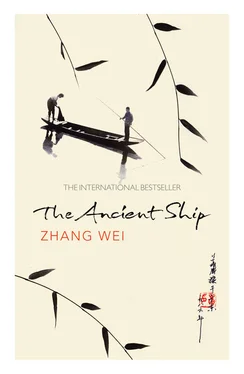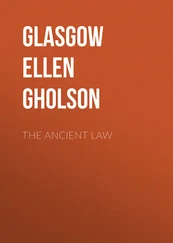Jiansu paled. The hand holding the pipe began to tremble. With difficulty, he put away his pipe and uttered a single, softly spoken sentence: “I want to take the noodle factory back from Zhao Duoduo.”
From where he stood just beyond the window, Zhichang heard every word. As soon as that sentence was uttered, a crack from somewhere inside the mill gave him a start; it sounded like someone had smacked against a steel rod. He thought something might have happened to one of the gears, but the mill kept turning. Baopu stood up, his eyes lighting up beneath the heavy ridge of his brow. He nodded. “I see.”
“The noodle factory has always carried the name Sui. It should be yours and mine.” Jiansu’s eyes bore into his brother.
Baopu shook his head. “It’s nobody’s. It belongs to the town of Wali.”
“But I can take it back.”
“No, you can’t. These days no one has that power.”
“I do.”
“No, you don’t. And you shouldn’t have such thoughts. Don’t forget our father. At first he thought the mill belonged to the Sui clan. This misunderstanding ruined his health. Twice he rode his horse out to pay off debts. He returned home the first time, but the second time he threw up blood, staining the back of his horse. Our father died in a sorghum field—”
With a shout Jiansu slammed his fist down onto the stool. Then he crouched in pain, holding the stool with both hands.
“Baopu, you, you…I didn’t want to but you made me tell you! You’ve taken the fight out of me, put out the fire, like smashing your fist into my head! But I’m not afraid. Don’t worry, I won’t stay my hand on this. You want me to spend the rest of my life sitting in the mill, like you, listening to the millstone rumble tearfully in circles, is that it? Never! That’s something no member of the Sui clan ought to do. None of our ancestors was ever that gutless…I won’t listen to you. I’ve held this inside me for decades. I’m thirty-six this year and still not married. You were, but your wife died. You should have a better life than most people, but you just sit in this mill, day in and day out. I hate you! I absolutely hate you! Today I want to make this perfectly clear: I hate the way you spend your days in this old mill…”
Zhichang stood beyond the window, stunned. He saw large beads of sweat roll off of Jiansu’s forehead and cheeks.
Sui Baopu recalled how little time his father had spent at the factory during Baopu’s teen years, preferring the solitude of the pier, where he could ponder things and gaze at the reflections of ship masts in the water. He would not return home until dinnertime. His stepmother, Huizi, was in her thirties. With her lips painted red, she would sit at the dinner table eating and keeping a worried eye on her husband, while Baopu watched anxiously to see if she swallowed the color on her lips along with her food. His stepmother, the pretty daughter of a rich man from Qingdao, liked to drink coffee. Baopu was a little afraid of her. Once, when she was in a good mood, she took him in her arms and planted a kiss on his smooth forehead. Sensing her warm, heaving breast, his heart raced as he lowered his head, not daring to let his gaze linger on her snow-white neck. “Mama,” he blurted out as his face reddened. She murmured a response. That was the first and last time he called her that. But he stopped being afraid of her.
One day Baopu found Huizi crying bitterly and writhing on the kang, nearly breathless. It wasn’t until later that he learned why his stepmother had been so grief-stricken: Her father, it turned out, had been murdered in Qingdao, caught selling land and factories for gold bullion to take out of China. Baopu was at a loss for words.
After that he began spending time in the study, which held many scrolls and more books than he could count. He found a date-colored wooden ball, so red it shone, and when he held it in his hand it felt incredibly smooth and very cold. There was also a box that played a lovely tune when he touched it.
One evening, when his father was in the middle of dinner, Zhang-Wang from the eastern section of town dropped in to borrow some money. He politely invited her to sit and poured tea for her. Then he went into his study to get the money, which she tucked into her sleeve and promised to repay after she’d sold a hundred clay tigers. “Don’t worry about it,” he said. “Go spend it any way you like.” Huizi glowered at him; Zhang-Wang noticed.
“How’s this?” she said. “Since I feel awkward taking your money, why don’t I tell your fortune?” With a wry smile, Father nodded his approval. Huizi just snorted. Zhang-Wang sat down in front of him, so close it made his lips quiver, and reached her hand up the opposite sleeve, where she counted on her fingers. She announced that he had a pair of red moles behind his left shoulder. The soup ladle fell from Huizi’s hand. As Zhang-Wang studied his face, her eyes rolled up into her head, and all Baopu could see were the whites. “Tell me the day and time of your birth,” she intoned. By this time Father had forgotten all about the food in front of him. He told her what she wanted to know in a weak voice. She began to shake; her eyeballs dropped back into place, and she fixed them on Father’s face. “I’m leaving, I must leave,” she said, raising her arms. With a parting glance at Huizi, she walked out the door. Baopu watched as his father sat like a statue, mumbling incoherently and rubbing his knees the rest of the day.
Over the days that followed, Father seemed laden down with anxieties. He busied himself with this and that, not quite sure what he ought to be doing. Finally he dug out an abacus and began working on accounts. Baopu asked what he was doing. “We owe people,” his father replied. Baopu could not believe that the richest family in town owed money to anyone, so he asked who it was owed to and how much. Suddenly the son was interrogating the father. “All the poor, wherever they live!” his father replied. “We’ve been behind in our obligations for generations…Huizi’s father was too, but then he refused to pay, and someone beat him to death!” Breathing hard, by then he was nearly shouting. He was becoming skeletal; his face had darkened. Always nicely groomed in the past, he now let his hair turn lusterless and ignored the specks of dandruff. Baopu could only gaze at his father fearfully. “You’re still young,” his father said, “you don’t understand…”
In the wake of this conversation, Baopu vaguely felt that he too was one of the destitute poor. From time to time he strolled over to the riverbank to watch the millstone rumble along. The man tending the stone at the time kept feeding beans into the eye with his wooden ladle; white foamy liquid flowed from beneath the stone, filling two large buckets, which were carried away by women. It was the same scene he’d witnessed in his youth. After leaving the mill, he’d walk over to the factory where the noodles were made and where steam filled the air with a smell that was both sweet and sour. The workers, male and female, wore little clothing, their naked arms coated with bean starch. As they worked in the misty air, they moved rhythmically, punctuated by cadenced shouts of “Hai! Hai!” A thin layer of water invariably covered the cobblestone floor. Water was the irreplaceable element here. People were continually stirring huge vats to wash the white noodles. On one of his visits, a worker spotted him. “Don’t splash any water on the young master!” she yelled anxiously. Baopu left in a hurry. He knew that one day this would no longer be his and that he was in fact born to be one of the destitute poor.
Father continued to spend time on the riverbank, appearing to be settling into deeper nostalgia for the ships that had visited from afar. One time he brought Baopu along. “This is where Uncle Buzhao sailed from,” he said, and Baopu could tell that his father missed his brother. On their way home, his father looked over at the old mills, drenched in the colors of the sunset, and stopped.
Читать дальше












